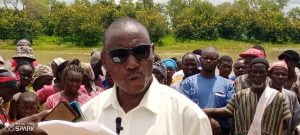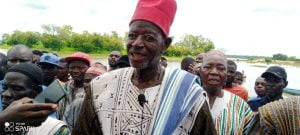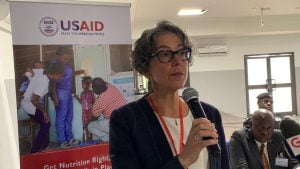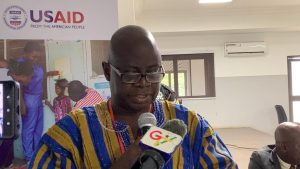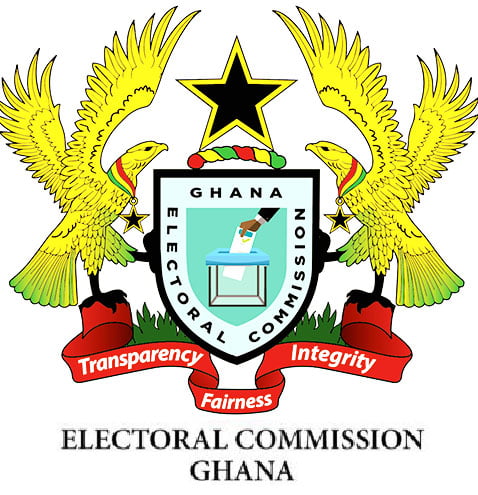Recently, it was reported by media outlet, Media Without Borders, that the Public Relations Officer of mining company, Earl International, Ebenezer Bognaab had orchestrated the removal of Benjamin Ndanbon, a representative of Charles Taleog Ndanbon.
“The company’s plump public relations officer, Ebenezer Bognaab, had sacked him and ordered the men to get him out of the yard after he refused to go home. Benjamin Ndanbon was sacked because his boss, Charles Taleog Ndanbon, dragged Earl International Group Ghana Gold Limited to court over a breach of agreement. Charles had introduced the Chinese company to Talensi in 2008 as a technical-service partner to his Yenyeya Mining Enterprise. The foreign partner was known as Shaanxi Mining Company Limited at the time,” the report stated.
Benjamin Ndandon, is reported to have been bundled out of the premises of Earl International where he was expected to represent the interest of his boss, as part of agreements between the mining company and the small scale miner.
“Benjamin’s role, as Charles’s sole representative, is to witness the gold production process in the yard and keep the records of production he takes on behalf of Yenyeya Mining Enterprise. Bognaab is said to have told Benjamin he was being sacked because it did not make sense to allow him in the yard while Charles was waging a legal battle against the Chinese,” the report added.
Additionally, Mr. Bognaab was stated to have refused to accept a writ from a bailiff.
“The first time he went there, he met the public relations officer. Bognaab refused to receive the writ, reportedly telling the court official that the management had instructed its staff not to receive any writ from any court,” the report said.
Meanwhile, Mr. Bognaab, has described as over dramatised and inaccurate, portions of the media outlet’s report.
“In the said publication, he makes several claims which are preposterous and not factual. They include but are not limited to: That one Benjamin Ndanbon was forcefully carried or thrown out of the yard of Earl International Group Ghana Gold Ltd by ‘Strong men’ on my instructions as Public Relations Officer of the company. That a High Court bailiff went through some torture before successfully serving writ of summons on the company through me. That the High Court bailiff visited our company premises twice to serve writ of summons. That I refused to see the bailiff on his second visit to the company premises while I sat in an air- conditioned office. That I deliberately refused to accept the writ of summons and acted evasively.”
Mr. Bognaab, stated that “Benjamin Ndanbon was NEVER forcefully or physically thrown out of our company premises, neither did I ever issue such instructions. Mr Ndanbon was only denied access to the company premises based on instructions from top management as a precautionary measure following a fall-out between the company and a partner the young man was representing. On the said date of the visit by Benjamin Ndanbon, my attention was drawn to his challenge in entering the premises. As PRO of the company, I made quick inquiries and then reverted to him via phone (because I was far away) to explain the reasons he was being denied access. It is therefore absurd for a journalist worth his salt to cook and dramatise an incident from the comfort of his office as was there in person.”
The PRO of Earl International additionally stated that the details of serving of the writ, as stated by the media report, was not accurate.
“The High Court Bailiff arrived in Gban on a single occasion and called me on the phone to meet me. Unfortunately, I was in Accra on the said day. We cordially agreed to meet when I return. This same High Court Bailiff is shocked at Adeti’s narration. Subsequently, a Circuit Court bailiff came over on a completely different matter. He was received in my office in the company of colleague officers and left after a brief interaction. The desire by the reporter to run with hearsay has manifested in how he presented this mix-up in his report. It is completely outrageous to suggest that I have been evasive in receiving writ of summons. As an employee of the company, I act on instructions on matters of the company. I had explained to the bailiffs on each encounter that writs and summons on the company should henceforth be served on our Lawyers or Directors of the company in an address that has been provided to the courts.”
Mr. Bognaab continued to say “The Wednesday September 20 High Court Ruling which formed the basis for the publication equally dismissed an application by Mr Charles Ndanbon for injunction on the operations of Earl International. Strangely, that portion of the court ruling did not find space in the publication.”
Source:A1radioonline.com|101.1MHz|Mark Kwasi Ahumah Smith|Bolgatanga














